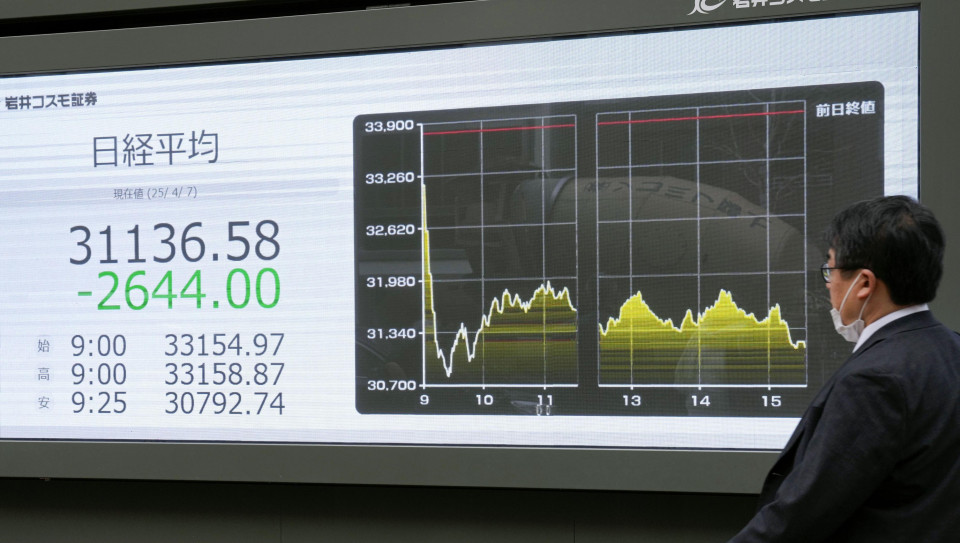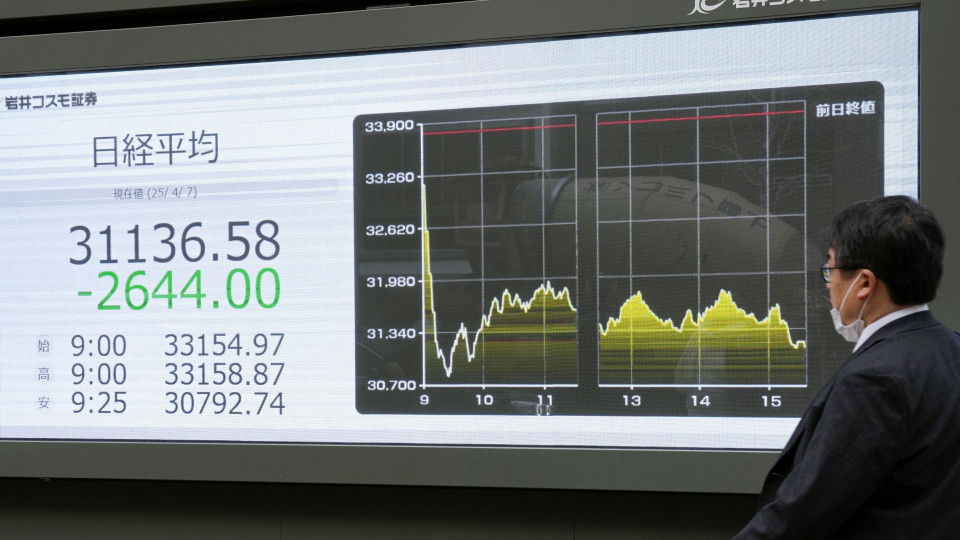Tokyo stocks plunged nearly 8 percent Monday, with the Nikkei index suffering its third-largest point drop on record, as global sell-offs continued amid heightening fears over a trade war and economic slump triggered by U.S. tariffs.
The 225-issue Nikkei Stock Average ended down 2,644.00 points, or 7.83 percent, from Friday at 31,136.58, its lowest closing level since Oct. 31, 2023. The broader Topix index finished 193.40 points, or 7.79 percent, lower at 2,288.66.
All industry sectors lost ground on the top-tier Prime Market, with decliners led by nonferrous metal, insurance and securities house issues.
The U.S. dollar briefly weakened to the upper 144 yen range as the yen, seen as a safe-haven asset, was sought amid lingering uncertainty over U.S. tariffs and their impact on the global economy, dealers said.
At 5 p.m., the dollar fetched 145.79-80 yen compared with 146.83-93 yen in New York and 146.27-29 yen in Tokyo at 5 p.m. Friday.

A financial data screen in Tokyo shows the Nikkei stock index shedding 2,644.00 points to close at 31,136.58 on April 7, 2025. (Kyodo)
The euro was quoted at $1.1001-1003 and 160.39-43 yen against $1.0959-0969 and 160.61-71 yen in New York and $1.1004-1006 and 160.96-161.00 yen in Tokyo late Friday afternoon.
On the bond market, the yield on the benchmark 10-year Japanese government bond briefly fell 0.055 percentage point to 1.105 percent from Friday’s close, its lowest level in about three months, as investors fled to the asset, which is considered relatively safer.
It ended the day at 1.110 percent. Bond prices move inversely to yields.
The stock market was hit by panic selling following Wall Street tumbles Friday as concerns of a trade war escalated after China announced retaliatory steps in response to sweeping U.S. reciprocal tariffs.
The Nikkei’s decline was the biggest since the 3,836-point drop registered on Oct. 20, 1987, the day after the Black Monday stock market crash.
The benchmark lost nearly 3,000 points falling below the key 31,000 line at one point, with heavyweight technology issues pressured after U.S. President Donald Trump said last week he plans to announce tariffs on semiconductors and pharmaceuticals soon, brokers said.
“There have been no countermeasures (from the Japanese and overseas governments) currently to respond to the risk of a worsening global economy and corporate earnings,” said Maki Sawada, a strategist at the Investment Content Department of Nomura Securities Co.
“There is only negative news coming out now,” she said, adding that the market likely has not bottomed out yet.
Other Asian stocks also plunged on selling fueled by concerns over a global recession as investors remained on high alert over retaliatory steps other countries could take.
“Stock declines are being caused by the irrational tariff policies of the U.S. administration under President Trump, and turmoil in markets is unlikely to settle unless the policies are revised,” said Hiroshi Watanabe, chief economist at Sony Financial Group Inc.
Among shares with a large impact on the Nikkei, Uniqlo clothing chain operator Fast Retailing shed 7.2 percent to 41,650 yen, while semiconductor-related Tokyo Electron dived 10.0 percent to 17,060 yen.
The circuit breaker was triggered for Nikkei and Topix futures, temporarily halting trading due to steep losses.
Related coverage:
FOCUS: U.S. tariff chaos brings pain and uncertainty to global markets
Japan PM exploring possibility of phone talks with Trump over tariffs
FOCUS:Former top aide of Trump says tariff compromise with Japan on horizon


AloJapan.com